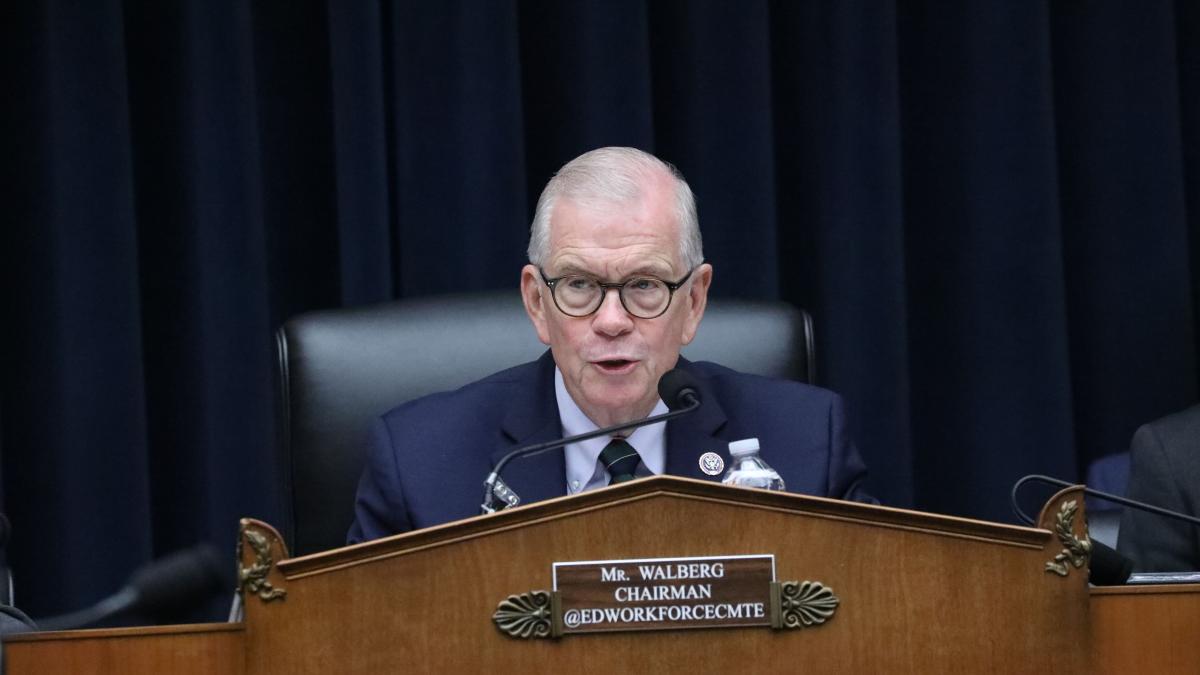JPost: Congressional Education c'mtee investigating NEA for 'antisemitic positions'

The US congressional Committee on Education and the Workforce is investigating the National Education Association (NEA) for its alleged antisemitic stance, the panel announced on Thursday.
The Republican representative for southern Michigan and the committee’s chairperson, Tim Walberg, sent a letter to the president of the largest American teachers’ union officially requesting documents, communications, meeting minutes, and agreements relating to antisemitism, Israel, and the Palestinians since Hamas’s October 7 massacre.
Walberg’s letter to the NEA president, Becky Pringle, raised concerns about several controversies surrounding its policies in 2025, including the contents of the NEA’s 2025 handbook.
The handbook, which contains documents such as the 3,000,000-strong union’s constitution, bylaws, rules, resolutions, policy statements, and new proposals, included new business items related to the Holocaust and Israeli-Palestinian conflict.
One item approved for further discussion on International Holocaust Remembrance Day proposed to promote the commemoration of the “more than 12,000,000 victims of the Holocaust from different faiths, ethnicities, races, political beliefs, genders, and gender identification, abilities/disabilities, and other targeted characteristics.”
Walberg noted that the framing of the proposal obscured the fact that Jews were the primary targets of the Nazi genocide.
Other new handbook business items referred to the NEA board’s proposal to educate members about “the difference between anti-Zionism and antisemitism.”
Walberg said that the item reflected ignorance concerning the Jewish people’s perspective, citing a 2023 Pew Research Center polling that indicated a majority of American Jewish adults held Israel as essential to the Jewish identity.
Further, he took issue with an NEA plan detailed in the notebook that suggested that teachers teach members about the Palestinian 1948 Nakba Day. Walberg contended that the new business item offered no context of the events leading up to the creation of the State of Israel and insinuated that the creation of the Jewish state was a catastrophe.
“When it comes to both the Holocaust and the founding of the State of Israel, the NEA’s interest in educating about ‘historical injustices,’ ‘ongoing trauma,’ and ‘diaspora’ does not include the Jewish people,” wrote Walberg.
Pringle addressed the controversy surrounding the handbook in a July 24 statement, saying that the document was not for classroom use, but a compilation of new proposals adopted by the NEA over the last year.
These suggestions included “calls to stand up against antisemitism, promote Holocaust remembrance and education, and promote content to mark Jewish American Heritage Month,” she had said.
“The National Education Association has opposed antisemitism throughout its history and is deeply committed to ensuring the safety and inclusion of Jewish educators and students,” said Pringle.
Additionally, “the NEA regularly shares resources and supports educator workshops on Holocaust education, antisemitism, and ways to promote understanding of the Jewish culture, heritage, and history,” she continued.
“This reflects the NEA’s ongoing commitment to teach about Holocaust history and to counter the antisemitism that laid the groundwork for the systematic murder of 6,000,000 Jews and the persecution and murder of millions of others by the Nazi regime.”
Walberg said that the committee was also concerned about how the NEA Representative Assembly had passed a July 8 non-binding resolution barring members from using, endorsing, and publicizing Anti-Defamation League materials. The NEA Board of Directors and Executive Committee decided not to implement the proposal.
“It was determined that this proposal would not further the NEA’s commitment to academic freedom, our membership, or our goals,” said Pringle.
She said in a July 18 statement that the union did not currently have a partnership with the ADL, and the reversal was not an endorsement of all the ADL’s work, adding that the committee condemned attacks on its members.
The NEA made its decisions not to adopt the proposal after speaking with the ADL, the Arab-American community, and Jewish American community leaders, Pringle continued.
“In light of the near-daily direct attacks being made against public education, our work together has never been more important. No amount of bullying can force us to abandon our commitment to our members and our values,” she said.
The ADL, the American Jewish Committee, the Conference of Presidents of Major American Jewish Organizations, and the Jewish Federations of North America welcomed the decision.
Over 375 organizations had sent a letter on July 14 to the NEA leadership decrying the proposed ADL ban. J Street also argued against the resolution in a Jul 15 statement.
Meanwhile, the Jewish Voice for Peace criticized the rejection of the ADL ban, charging that the NEA had succumbed to the pressure of “anti-Palestinian, pro-genocide allies” to allow materials from an organization that supposedly used accusations of antisemitism to silence criticism of Israel.
Walberg said on Thursday that the ADL measure and the contents of the handbook raised “serious concerns that antisemitism has infected the NEA,” and the investigation sought to determine if the union was “contributing to antisemitism among its members and in classrooms across the United States.”
The investigation could influence potential legislative changes, he said, including laws to address antisemitic discrimination within labor unions.